Welcome to our article exploring the fascinating influence of Greek mythology on literature. Throughout the ages, Greek mythology has left an indelible mark on literary works, shaping characters, themes, and narratives that continue to captivate readers today. Join us as we delve into the enduring presence of these timeless tales in our favorite books.
Key Takeaways:
- Greek mythology has had a profound impact on literature throughout history.
- It reflects the rich cultural heritage of ancient Greece and its relevance in European culture.
- Greek mythology has influenced the English language and served as a source of inspiration for countless literary works.
- It has shaped mythological and epic themes, as well as symbolism and archetypes in literature.
- Greek mythology has played a crucial role in the development of tragedy, drama, romance, fantasy, and adventure genres.
The Origins and Significance of Greek Mythology
Greek mythology, originating from ancient Greece, holds immense significance in various aspects of European culture. It serves as a window into the rich cultural heritage of the ancient Greek civilization, shaping their religious beliefs, political environment, and cultural practices. The myths and legends of Greek mythology were initially passed down orally before being documented, offering insights into the traditions and values of the ancient Greeks.
Exploring the origins of Greek mythology allows us to comprehend the beliefs and societal norms of ancient Greece. It symbolizes their way of explaining and understanding the world around them, making it a fundamental aspect of their civilization. The stories of gods, goddesses, and mythical creatures provide a framework for understanding natural phenomena, human emotions, and the complex dynamics of the divine and mortal realms.
From its roots in ancient Greece, Greek mythology has exerted a lasting influence on literature, art, and culture throughout history. Its impact spans across various genres, from epic poems and tragedies to romance novels and fantasy adventures. The enduring legacy of Greek mythology in literature is a testament to its timeless themes, captivating characters, and universal archetypes that continue to resonate with readers across generations.
The Significance of Greek Mythology in European Culture
- Greek mythology is an integral part of European cultural heritage.
- It shaped the religious beliefs and practices in ancient Greece.
- The myths and legends offer insights into the political and social environment of the time.
- Greek mythology explained natural phenomena and human emotions.
The Influence of Greek Mythology on English Culture
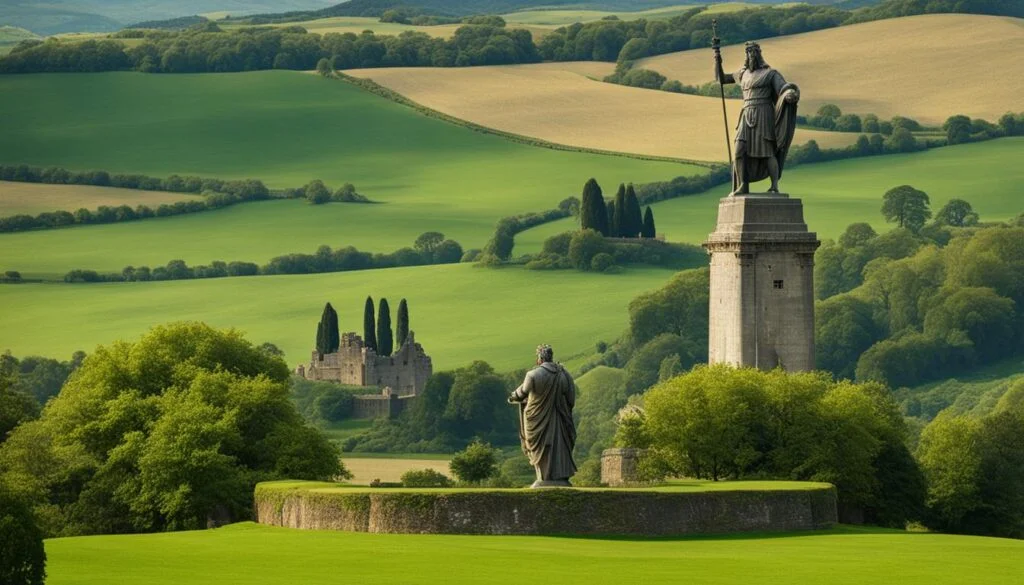
Greek mythology holds a significant place in English culture, leaving its indelible mark on various aspects, including language and literature. The impact of Greek myths can still be felt today, with many words and allusions in the English language tracing their origins back to these ancient tales. Allusive idioms such as “Pandora’s box” and “Achilles’ heel” add color and depth to our everyday conversations, drawing on the vivid imagery and powerful symbolism of Greek mythology.
Furthermore, Greek myths serve as a wellspring of inspiration for English literature, with countless stories and themes drawing from these ancient narratives. From the tragic love story of Orpheus and Eurydice to the epic adventures of Odysseus in the Odyssey, these tales continue to captivate readers and ignite the imagination of writers. The enduring appeal of Greek mythology lies in its ability to explore universal human experiences, such as love, loss, heroism, and the complexities of the human condition.
The Influence of Greek Mythology on Language:
- The English language is rich with words derived from Greek mythology, such as “narcissism,” “tantalize,” and “nemesis.”
- Allusive idioms, such as “Pandora’s box” and “Achilles’ heel,” provide a concise way to convey complex ideas or situations.
- Names of planets, constellations, and celestial bodies are often inspired by Greek mythology, such as “Aphrodite” and “Zeus.”
The Influence of Greek Mythology on Literature:
- Greek myths have served as a rich source of inspiration for countless literary works, from Shakespeare’s “Midsummer Night’s Dream” to Margaret Atwood’s “The Penelopiad.”
- Themes such as the hero’s journey, tragic love, and the battle between gods and mortals are recurring motifs in literature influenced by Greek mythology.
- Characters from Greek myths, like Medusa, Antigone, and Hercules, continue to shape the development of literary characters and archetypes.
Through its influence on language and literature, Greek mythology has become deeply ingrained in English culture, enriching our communication and expanding our imaginative horizons. Its enduring legacy serves as a testament to the timeless power and fascination of these ancient tales.
Greek Mythology’s Influence on Mythological and Epic Themes
Greek mythology has had a significant impact on the development of mythological and epic themes in art and literature. The rich tapestry of Greek myths and legends has provided a wealth of material for storytellers throughout history, shaping the narratives and characters found in many literary works. From the ancient epics of Homer, such as the Iliad and the Odyssey, to the tragic plays of Aeschylus, Sophocles, and Euripides, Greek mythology has served as a timeless source of inspiration.
These mythological and epic themes explore universal human experiences and emotions, delving into the depths of heroism, love, tragedy, and adventure. The larger-than-life heroes such as Achilles, Heracles, and Perseus captivate readers with their extraordinary feats and moral dilemmas. The quests, battles, and encounters with gods and monsters create a sense of wonder and escapism, transporting readers to mythical realms filled with both danger and beauty.
The Influence on Art and Literature
Greek mythology’s influence on art and literature can be seen in the countless adaptations and reinterpretations of these myths throughout history. Artists, poets, and writers have drawn inspiration from Greek mythology to create their own masterpieces. The gods, goddesses, and mythical creatures have been immortalized in paintings, sculptures, and illustrations, capturing their power and beauty.
- Artists have depicted scenes from Greek myths, bringing these stories to life through their visual representations.
- Poets have composed epic poems inspired by Greek mythology, paying homage to the heroes and gods of ancient Greece.
- Writers have incorporated mythological elements and themes into their novels, imbuing their stories with a sense of grandeur and depth.
The enduring legacy of Greek mythology in art and literature speaks to its timeless appeal and universal themes. The influence of these mythological and epic themes continues to shape and inspire the works of artists and writers, ensuring that the stories of Greek mythology remain an integral part of our cultural heritage.
Greek Mythology’s Influence on Heroes and Heroic Narratives
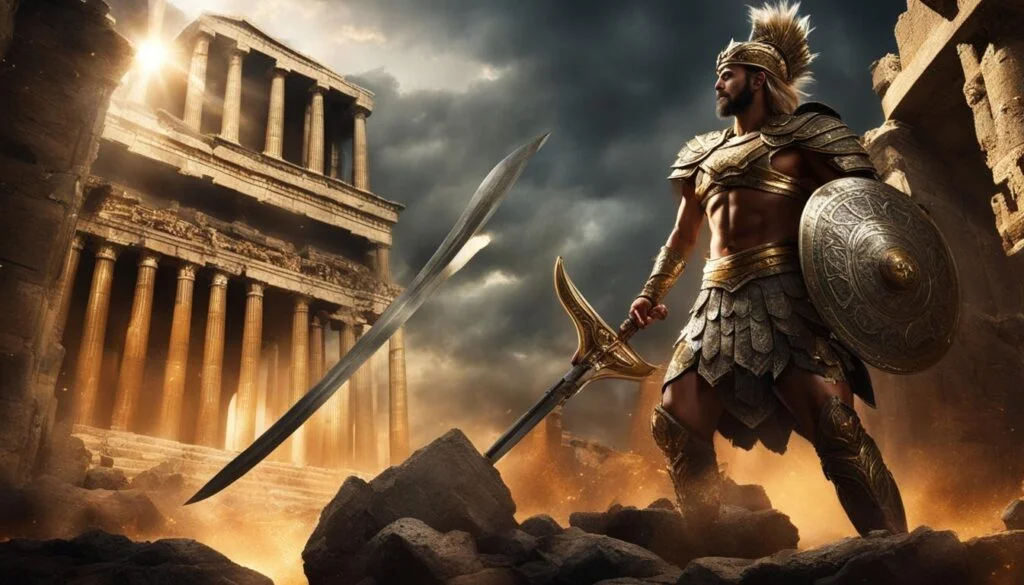
Greek mythology has long been a source of inspiration for the creation of heroes and the crafting of heroic narratives in literature. The stories of legendary figures like Achilles, Heracles, Perseus, and Jason have captivated audiences for centuries, showcasing their extraordinary feats and courageous endeavors.
These heroic narratives have had a profound influence on literature, shaping the development of characters and the exploration of themes such as heroism, honor, and the struggle between good and evil. From ancient Greek epics such as the Iliad and the Odyssey to modern novels and films, the impact of Greek mythology on heroic storytelling is evident.
The Influence of Greek Mythology on Heroic Archetypes
- Heroic Archetypes: Greek mythology has provided a rich array of archetypal heroes that continue to resonate with readers. These archetypes embody the qualities of bravery, resilience, and self-sacrifice, serving as inspirational figures for protagonists in literature.
- The Monomyth: The concept of the hero’s journey, popularized by scholar Joseph Campbell, finds its roots in Greek mythology. This archetype follows a pattern of stages that a hero undergoes, including the call to adventure, facing trials and challenges, and finally achieving a transformative victory.
- Moral Dilemmas: The heroes of Greek mythology often face moral dilemmas and inner conflicts, highlighting the complexities of human nature. These internal struggles continue to shape the development of literary heroes, adding depth and complexity to their character arcs.
Overall, the influence of Greek mythology on heroes and heroic narratives in literature is profound. The enduring appeal of these ancient tales and archetypal figures ensures that Greek mythology will continue to inspire and shape the heroes we encounter in the pages of our favorite books.
Greek Mythology’s Influence on Symbolism and Archetypes
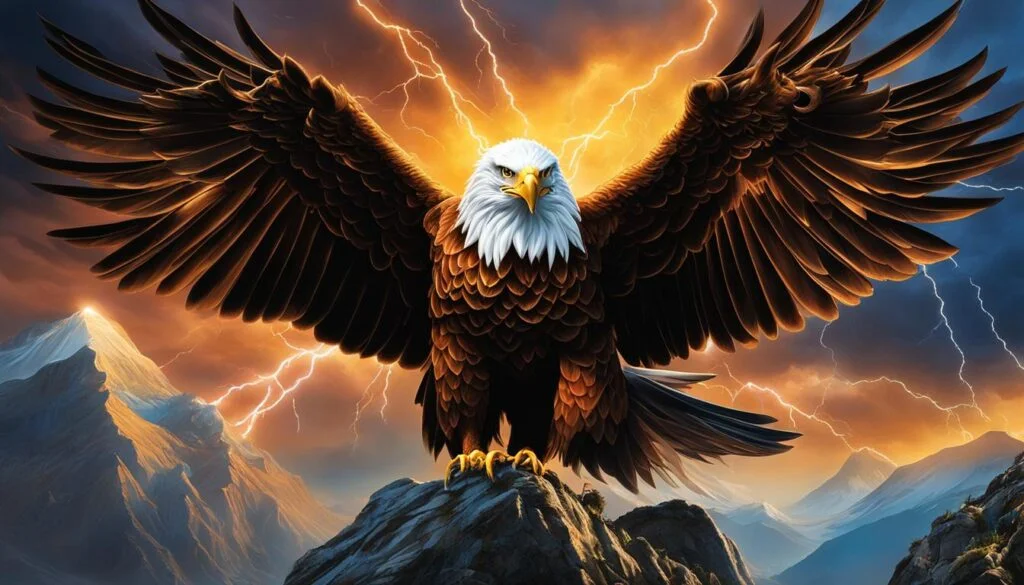
Greek mythology has left an indelible mark on literature through its rich symbolism and archetypes. The gods and goddesses of Greek mythology embody universal traits and represent different aspects of human nature. For example, Zeus, the king of the gods, symbolizes power and authority, while Athena, the goddess of wisdom, represents intellect and strategic thinking. These symbols and archetypes have been woven into the fabric of literature, adding depth and meaning to characters and stories.
Symbols in Greek Mythology
- The lightning bolt, associated with Zeus, symbolizes divine power and the forces of nature.
- The olive branch, a symbol of peace, is often associated with Athena.
- The trident, wielded by Poseidon, symbolizes his dominion over the sea.
- The laurel wreath, worn by Apollo, is a symbol of victory and achievement.
These symbols, along with many others found in Greek mythology, have been used by writers throughout history to convey complex themes and ideas. They provide readers with a visual shorthand that enhances their understanding of the characters and the story.
Archetypes in Greek Mythology
- The hero: Characters like Hercules and Perseus embody the archetype of the hero on a mythical quest, overcoming challenges and facing supernatural beings.
- The trickster: Hermes, the messenger of the gods, represents the archetype of the trickster, often using his cunning to deceive and outsmart others.
- The wise old man/woman: Characters like Zeus and Athena embody the archetype of the wise old man or woman, offering guidance and wisdom to others.
These archetypes, rooted in Greek mythology, provide a framework for writers to explore universal themes and create compelling characters that resonate with readers. They tap into the collective unconscious, evoking familiar emotions and experiences that transcend time and culture.
The influence of Greek mythology on symbolism and archetypes in literature is undeniable. Its enduring legacy can be seen in the countless stories that continue to captivate readers, drawing inspiration from the timeless tales of gods and heroes.
Greek Mythology’s Influence on Tragedy and Drama
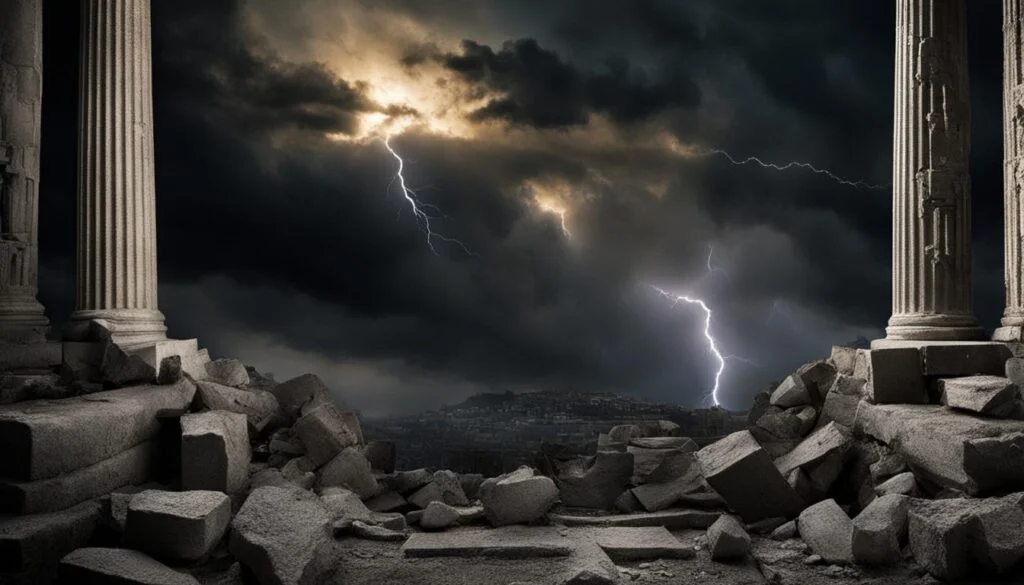
Greek mythology has played a crucial role in the development of tragedy and drama throughout the ages. The ancient Greek tragedians, such as Aeschylus, Sophocles, and Euripides, drew heavily from Greek myths to create their iconic plays. These tragedies explored universal themes and human emotions, using the stories of gods and heroes to shed light on the human condition.
From the tale of Oedipus to the tragedy of Medea, Greek mythology provided a rich repertoire of narratives that resonated with audiences. The gods and heroes of Greek mythology served as powerful symbols, representing the triumphs and flaws of humanity. Through their stories, the tragedians delved into complex moral dilemmas, inner conflicts, and the consequences of hubris.
Greek Mythology’s Influence on Drama:
- Providing a rich repertoire of narratives for playwrights to draw inspiration from
- Exploring universal themes and human emotions
- Using the stories of gods and heroes to shed light on the human condition
- Creating powerful symbols to represent the triumphs and flaws of humanity
- Delving into complex moral dilemmas and inner conflicts
Even today, the influence of Greek mythology can be seen in contemporary literature, with many writers continuing to draw inspiration from these ancient narratives. The tragic heroes and their downfalls, the exploration of fate and free will, and the examination of human nature are themes that continue to resonate with readers and shape the development of literary works.
Greek mythology’s impact on tragedy and drama remains enduring and profound, serving as a testament to the timeless power of these ancient tales.
Greek Mythology’s Influence on Romance and Love Stories

Greek mythology has long served as a rich source of inspiration for romance and love stories in literature. The captivating tales of love and desire found within the mythological realm have provided a foundation for countless writers to explore the complexities of human relationships and the power of passion. From forbidden love to tales of sacrifice, Greek mythology continues to shape the landscape of romance literature.
One of the most famous love stories in Greek mythology is that of Eros and Psyche. Their epic romance, filled with trials and tribulations, has been retold in various forms throughout literary history. The enduring theme of forbidden love, where mortal and divine beings find themselves entangled in a passionate affair, has found its way into numerous romance novels and plays.
The Influence of Greek Mythology on Romance
- Themes of forbidden love and star-crossed lovers
- Exploration of the power of love and its ability to overcome obstacles
- Use of mythological figures as symbols of passion and desire
- Emphasis on sacrifice and devotion in romantic relationships
- Inspiration for epic, sweeping love stories
The influence of Greek mythology extends beyond individual love stories. It has also shaped the broader genre of romance literature, providing a foundation for recurring themes and archetypes. The tales of gods and goddesses, their romantic entanglements and the consequences of their actions, have become archetypal representations of love and desire.
Moreover, the enduring legacy of Greek mythology in romance literature can be seen in the exploration of universal themes such as sacrifice, devotion, and the transformative power of love. These themes resonate with readers across time and cultures, making Greek mythology an everlasting wellspring of inspiration for romance writers.
Examples of Greek Mythology’s Influence
- Shakespeare’s “Romeo and Juliet” draws upon the themes of forbidden love and tragic romance, echoing the tale of Pyramus and Thisbe.
- Charlotte Brontë’s “Jane Eyre” explores the complexities of love through the character of Mr. Rochester, whose story bears similarities to the myth of Cupid and Psyche.
- Stephanie Meyer’s “Twilight” series builds on the concept of forbidden love between a mortal and a vampire, echoing the story of Persephone and Hades.
In conclusion, Greek mythology’s influence on romance and love stories in literature is undeniable. The timeless themes, archetypal characters, and epic narratives found within Greek mythology continue to inspire and captivate readers and writers alike. Whether it is the exploration of forbidden love, the portrayal of sacrifice and devotion, or the use of mythological figures as symbols of passion, Greek mythology’s impact on the romance genre remains a testament to its enduring power.
Greek Mythology’s Influence on Fantasy and Adventure
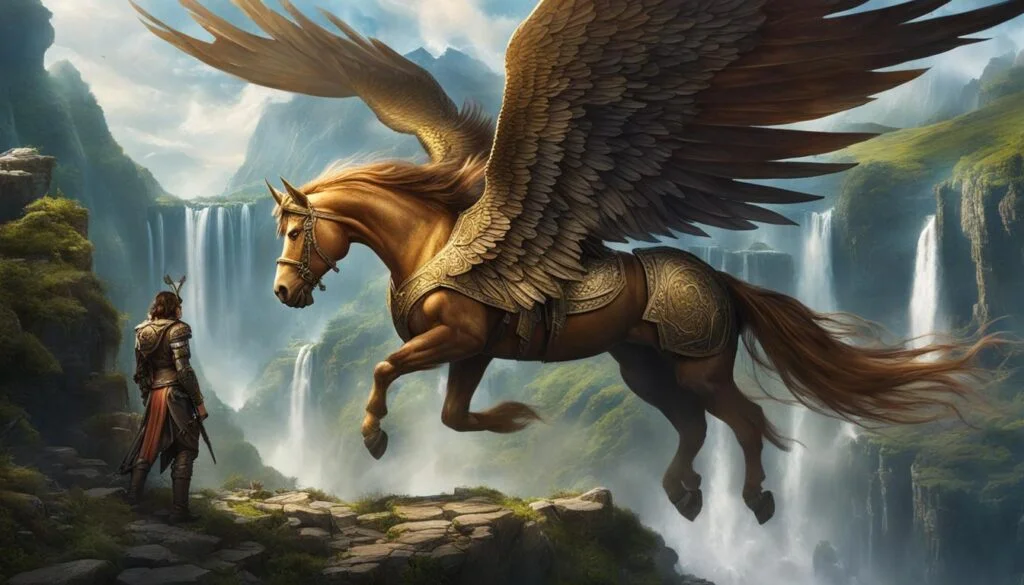
Greek mythology has had a profound influence on the genre of fantasy and adventure literature. The enchanting quests, fearsome monsters, and magical creatures found in Greek myths have inspired countless authors to create fantastical worlds and epic adventures of their own. These mythical tales have sparked our imagination and transported us to realms filled with heroes, gods, and extraordinary beings.
From the timeless epic of Odysseus’ journey in the Odyssey to the epic battles against mythical creatures in Percy Jackson’s adventures, Greek mythology has provided a rich foundation for fantastical storytelling. Authors have drawn upon the vast pantheon of Greek gods and goddesses, weaving their captivating tales into narratives that captivate readers of all ages. The allure of these mythological elements adds depth and excitement to the worlds they create, creating a sense of wonder and awe.
The Influence of Greek Mythology on Fantasy and Adventure Literature:
- Creation of intricate worlds: Greek mythology’s influence can be seen in the creation of intricate and elaborate fantasy worlds. Authors skillfully incorporate elements of Greek mythology, such as divine intervention, mythical creatures, and epic quests, to build immersive universes that transport readers into magical realms.
- Inspiration for heroes: The heroes of Greek mythology, with their extraordinary powers and trials, have served as inspiration for the protagonists of many fantasy and adventure stories. These heroes embody timeless virtues such as bravery, resilience, and determination, instilling a sense of heroism in the hearts of readers.
- Exploration of universal themes: Greek mythology explores universal themes, such as the battle between good and evil, the pursuit of power, and the consequences of hubris. Fantasy and adventure literature often draw from these themes, providing readers with thought-provoking narratives that delve into the depths of human nature.
- Legacy of mythical creatures: Greek mythology introduced a myriad of mythical creatures, from the majestic Pegasus to the fearsome Hydra. These fantastical beings have become iconic in fantasy literature, captivating readers with their unique characteristics and adding an element of wonder and danger to the stories.
Greek mythology’s enduring influence on fantasy and adventure literature ensures that readers can continue to embark on remarkable journeys through imaginative worlds filled with magic, heroism, and mythical creatures. The timeless appeal of these mythological themes resonates with us, evoking a sense of wonder and igniting our imaginations.
Conclusion
In conclusion, Greek mythology has had a profound and enduring legacy in the world of literature. Its timeless tales have shaped characters, themes, and narratives across different genres and time periods. From ancient Greek epics to modern novels, the influence of Greek mythology on literature is undeniable.
Through its rich tapestry of myths and legends, Greek mythology has provided a wealth of inspiration for writers throughout history. The themes of heroism, love, tragedy, and adventure found in these ancient stories continue to captivate readers and hold a special place in our literary landscape.
The influence of Greek mythology can be seen in the enduring presence of mythological themes and archetypes in literature. The gods and goddesses, heroes and villains, and mythical creatures that populate Greek mythology have become universal symbols and archetypes that add depth and meaning to characters and stories.
As we continue to explore the depths of human nature and the human experience through literature, the legacy of Greek mythology will remain a powerful force. Its impact on literature is a testament to the timelessness and resonance of these ancient tales, ensuring that Greek mythology will continue to inspire and captivate readers for generations to come.
FAQ
How has Greek mythology influenced literature?
Greek mythology has had a profound influence on literature throughout the ages, shaping the characters, themes, and narratives found in countless literary works.
What is the significance of Greek mythology?
Greek mythology reflects the religion, political environment, and cultural beliefs of ancient Greece, making it an important aspect of their civilization. Its significance lies in its ability to explain and make sense of the world in a way that resonated with the ancient Greeks.
How has Greek mythology influenced English culture?
Greek mythology has influenced various aspects of English culture, including language and literature. Many words and allusions in the English language have their origins in Greek mythology. Additionally, Greek myths serve as a source of inspiration for English literature, with countless stories and themes drawing from these ancient tales.
In what ways has Greek mythology influenced mythological and epic themes?
Greek mythology has provided a rich source of material for storytelling in art and literature. From the works of Homer to the tragedies of Aeschylus, Sophocles, and Euripides, Greek mythology has shaped the narratives and characters found in many literary works.
How has Greek mythology influenced heroes and heroic narratives?
Greek mythology is renowned for its heroes and their extraordinary feats. Stories of heroes such as Achilles, Heracles (Hercules), Perseus, and Jason have inspired countless literary works, from ancient Greek epics to modern novels and films.
What is the influence of Greek mythology on symbolism and archetypes?
Greek mythology is rich in symbolism and archetypes, which have been used by writers throughout history to add depth and meaning to their characters and stories. The influence of Greek mythology on symbolism and archetypes contributes to the enduring relevance and appeal of these narratives in literature.
How has Greek mythology influenced tragedy and drama?
Greek mythology has played a crucial role in the development of tragedy and drama. Ancient Greek tragedians drew heavily from Greek myths to create their plays, exploring universal themes and human emotions through the stories of gods and heroes.
How has Greek mythology influenced romance and love stories?
Greek mythology is replete with tales of romance and love, which have served as a source of inspiration for countless romance novels, poems, and plays. Themes of forbidden love, sacrifice, and the power of love have been explored and reimagined by writers across different time periods, owing a debt of influence to Greek mythology.
How has Greek mythology influenced fantasy and adventure literature?
The quests, monsters, and magical creatures found in Greek myths have inspired countless authors to create fantastical worlds and epic adventures of their own. The influence of Greek mythology on fantasy literature is evident in the enduring appeal of these mythical themes.
What is the enduring legacy of Greek mythology in literature?
Greek mythology’s influence on literature is undeniable. Its timeless tales have shaped characters, themes, and narratives across different genres and time periods, ensuring its legacy in the literary world for generations to come.




